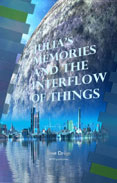
 |
As a famous, renowned artist, 55-year-old Julia sets about recording her memoirs of a difficult childhood and the formative experiences that led to her significant career in art. Beginning with her youth, Julia recalls the differing forms of parenting she received from her businessman father and her artist mother. Julia’s father offers her nurturing and support but is frequently away on work, while her mother holds her to exceedingly high expectations as a member of society but also treats her coolly, almost as a threat. As Julia grows older, she makes friends and discovers in herself a streak of activism, spurred on by tragedies in her life both perceived and real.
Meanwhile, in the present, something in Julia’s digitally-recorded memoirs is creeping to the front and throws everything she knows up in the air. A group known as FreeHack helps Julia awaken from her false reality—one controlled by artificial intelligence headed by Ypsilon, a program that has replicated itself innumerably and risen to power in order to put a stop to the pain and destruction caused by humanity. Now alert and wise to the truth of the world in 2050 rather than her false perceptions, she must deal with the strict caste system and restrictions on knowledge placed by Ypsilon. Along with her allies and friends, Julia must make sense of this new world, where people readily engage in satisfaction via drugs and social media, keeping their blinders on at the cost of free will and arguably their own humanity.
This volume combines two books which transition immediately from one to the other. The first book focuses almost entirely on Julia’s past, raising questions and performing worldbuilding, while the second takes that information and turns it on its head in an enthralling, dystopian way. The use of memoir as a narrative form, allowing Julia to tell her own story while questioning the accuracy of her memory or discussing her imaginary friends or time in a psychiatric hospital, brilliantly foreshadows the core component to the story about whether one questions or accepts what they believe to be real. This, combined with the use of brief multiple perspectives from other characters (Jules at first, Ypsilon itself in the second book) and the dreamlike prose that reads like a transcript of someone’s own disjointed thoughts, gives these stories a healthy dose of character that sets it apart from its peers. The conflict between man and machine, particularly tying in modern technological habits like social media, call to mind popular works of science fiction such as The Matrix or even the Terminator series.
It is fascinating, though, to see in Julia’s Memories what is essentially a very human story about growing up and forging an identity regardless of the wishes of others become the foundation for a traditional science fiction tale in The Interflow of Things. It shows not only a degree of flexibility in the author’s storytelling range but also a strong sense of vision and story development, moving characters and themes from one genre to the next in mere pages. Setting itself initially among present times and events, the author provides some indirect warnings about the way people live their lives today and what they give up by endlessly chasing distraction, recognition, and agreement in online interaction. These stories go from peaceful and introspective to imaginative and tense, and readers who like surprises in their fiction will be kept on their toes as these interlocking books develop and unfold.